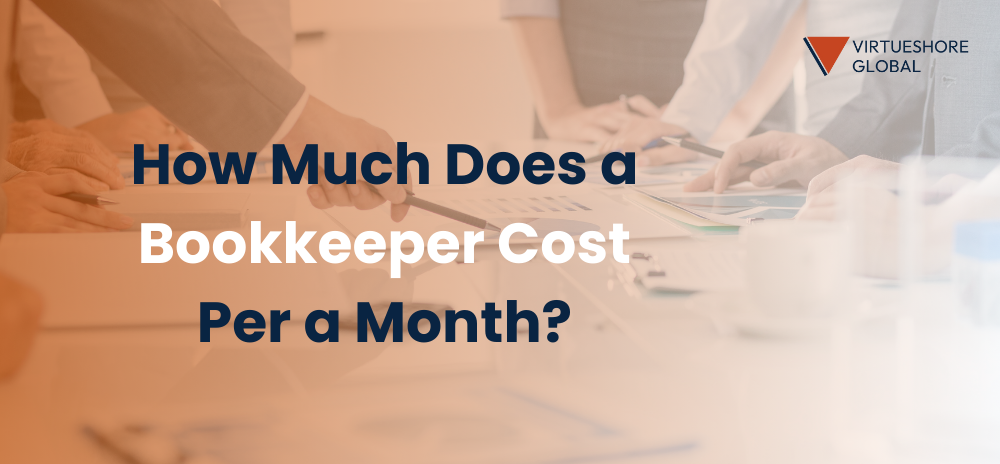Managing your business finances is crucial, and whether you hire an in-house bookkeeper or outsource to a specialist service is smart. We’ll explore the cost of hiring a bookkeeper, ensuring you make informed decisions. A bookkeeper handles various financial tasks, making your life easier and ensuring you’re prepared for tax season.
Let’s explore how much a bookkeeper costs per a month and what is the cost of outsourcing accounting services.
What Does a Bookkeeper Do?
A bookkeeper is a financial professional responsible for managing and organizing a business’s financial records. Their role is essential in maintaining accurate financial data, which is crucial for making informed business decisions and complying with tax regulations.
Here are the key responsibilities and tasks that a bookkeeper typically handles:
- Recording Transactions
Bookkeepers record all financial transactions in the company’s financial ledger, including sales, purchases, expenses, and payments. These professionals ensure that each transaction is accurately documented and categorized.
- Managing Accounts
Bookkeepers manage various financial accounts, such as accounts receivable (money owed to the business) and accounts payable (money owed by the business). They track these accounts to ensure timely payments and collections.
- Reconciling Bank Statements
Bookkeepers reconcile the company’s bank statements with its financial records. This process helps identify any discrepancies or errors in the financial data.
- Ensuring Financial Accuracy
Bookkeepers play a crucial role in maintaining the accuracy of financial records. They follow established accounting principles to prevent errors and discrepancies.
- Generating Financial Reports
Bookkeepers prepare financial reports, including balance sheets, cash flow statements and income statements. These reports provide valuable key insights into the company’s financial health.
- Managing Payroll
In some cases, bookkeepers are responsible for processing payroll. They calculate employee salaries, deductions, and taxes, ensuring that employees are paid promptly and accurately.
- Tax Preparation
Bookkeepers may assist with tax preparation by organizing financial records and providing necessary documentation to accountants or tax professionals.
- Advising on Financial Practices
While not financial advisors, bookkeepers can offer advice on sound financial practices, such as managing expenses, improving cash flow, and maintaining financial stability.
- Maintaining Financial Records
Bookkeepers systematically record all financial transactions and maintain an organized financial filing system.
- Compliance
They ensure that the company complies with financial regulations and tax laws, helping prevent legal issues and penalties.
All in all, a bookkeeper is essential for a business’s financial operations. They manage daily financial tasks, maintain precise records, and provide vital financial data for decision-making. Their role ensures financial stability, compliance, and overall business success. As businesses expand, bookkeepers may collaborate with accountants and financial experts to provide comprehensive financial management.
Understanding Bookkeeping Costs
Understanding bookkeeping costs is essential for any business owner. It involves considering various factors that can influence the pricing structure of bookkeeping services, such as:
- Transaction Complexity
One primary factor affecting bookkeeping costs is the complexity of a company’s financial transactions. In essence, the more complex and numerous the financial transactions, the more time and effort a bookkeeper must spend recording and reconciling them. Complex transactions may include various income sources, multiple expenses, inventory management, and international transactions. As complexity increases, so does the bookkeeping fee.
- Location
Location plays a significant role in bookkeeping costs. In general, the cost of living and business expenses varies widely from one location to another. Bookkeepers in major metropolitan areas tend to charge higher rates than those in suburbs or rural areas. It’s important for businesses to consider their geographical location when budgeting for bookkeeping services.
- Expertise and Experience
A bookkeeper’s expertise and experience can significantly impact the pricing structure. Bookkeepers with specialized knowledge or industry-specific experience may charge premium rates due to their ability to handle complex financial matters or provide valuable insights. Conversely, less experienced bookkeepers or those with general expertise may offer more affordable rates.
- Pricing Models
Bookkeepers may offer different pricing models to their clients. Some standard pricing models include hourly rates, monthly flat fees, or per-transaction charges. The choice of pricing model can affect the overall cost of bookkeeping services. Hourly rates are based on the time spent on tasks, while monthly flat fees provide consistency in budgeting. Per-transaction charges may be suitable for businesses with a low volume of transactions.
- Additional Services
Beyond basic bookkeeping tasks, bookkeepers may offer additional services such as financial analysis, tax preparation, payroll processing, or financial consulting. These supplementary services can increase the overall cost but may be valuable for businesses seeking comprehensive financial support. It’s essential to discuss which services are included in the quoted price and which come at an extra cost.
- Industry Specialization
Bookkeepers with expertise in specific industries may charge higher rates due to their ability to navigate industry-specific regulations, compliance requirements, and financial intricacies. These specialized bookkeepers can offer tailored solutions that provide additional value to businesses operating within those industries.
- Size and Scale of Business
The size and scale of a business can also influence bookkeeping costs. Larger enterprises with extensive financial operations may require more extensive bookkeeping services, leading to higher fees. Conversely, small businesses with simpler financial structures may incur lower bookkeeping costs. Understanding the unique needs of your business in terms of size and complexity is crucial for accurate cost assessment.
- Negotiation and Contracts
Businesses should be prepared to negotiate bookkeeping rates. Bookkeepers may be open to discussing pricing based on the scope of work, frequency of services, and contract duration. Entering into a long-term contract can often result in discounted rates compared to short-term agreements.
- Average Costs
On average, basic bookkeeping services for small to medium-sized businesses typically range from $300 to $700 per month. However, this cost can vary significantly depending on the factors mentioned above. Small businesses with minimal transactions and uncomplicated financial structures may find bookkeepers on the lower end of this range, while larger enterprises with complex financial operations may expect to pay toward the higher end.
Basic Bookkeeping vs. Full-Service Accounting
Understanding the distinctions between basic bookkeeping and full-service accounting is essential in financial management. Each option offers unique benefits and caters to varying business requirements.
Let’s delve deeper into these two approaches.
- Basic Bookkeeping
Scope of Services:
Basic bookkeeping involves fundamental financial tasks aimed at recording and organizing financial transactions. Bookkeepers ensure that all income and expenses are accurately documented. They typically handle tasks such as data entry, reconciling bank statements, categorizing transactions, and maintaining the general ledger.
Costs:
Basic bookkeeping is cost-effective compared to full-service accounting. Monthly rates for basic bookkeeping services typically range from $300 to $700, making it an attractive option for small enterprises and startups with limited budgets.
Ideal for:
- Small businesses with straightforward financial needs.
- Startups looking for cost-effective financial management.
Businesses that want to outsource routine financial tasks, allowing them to focus on core operations.
Pros:
- Cost-effective.
- Simplifies financial recordkeeping.
- Suitable for businesses with fewer transactions.
- Ideal for startups and small businesses.
Cons:
- Limited in-depth financial analysis.
- May not provide strategic financial guidance.
- Full-Service Accounting
Scope of Services:
Full-service accounting encompasses a broader spectrum of financial management tasks. In addition to bookkeeping functions, it includes financial analysis, tax planning, budgeting, and advisory services. Accountants or accounting firms offering full-service accounting provide comprehensive support for a business’s financial health.
Costs:
Full-service accounting is more comprehensive and, consequently, more expensive than basic bookkeeping. Costs can vary significantly based on the complexity of your financial needs and the level of expertise required. Monthly fees can range from $1,000 to $5,000 or more.
Ideal for:
- Medium to large businesses with complex financial structures.
- Businesses seeking strategic financial planning and guidance.
- Companies with significant transaction volumes and intricate financial reporting needs.
Pros:
- Comprehensive financial services.
- Strategic financial planning and analysis.
- Tax planning and compliance.
- Ideal for businesses with complex financial needs.
Cons:
- Higher costs.
- May be excessive for small businesses with simple financial requirements.
- Choosing the Right Option
To determine whether basic bookkeeping or full-service accounting is the right choice for your business, consider the following factors:
- Business size and complexity: Assess the size and complexity of your business’s financial operations. Smaller businesses with straightforward finances may find basic bookkeeping sufficient, while larger enterprises benefit from the depth of services offered by full-service accounting.
- Budget: Evaluate your budget constraints. Basic bookkeeping may be the more affordable choice if you are a startup or small business with limited financial resources. Conversely, if your budget allows, full-service accounting offers comprehensive financial management.
- Financial goals: Consider your long-term financial goals. If you aim to grow and require strategic financial planning, full-service accounting provides the expertise and guidance needed to achieve those objectives.
- Regulatory compliance: Businesses in highly regulated industries or those with complex tax obligations may find full-service accounting crucial for compliance.
- In-house vs. outsourced: Decide whether you want to handle financial management in-house or outsource it to professionals. Full-service accounting often involves outsourcing to an accounting firm.
- Scalability: Think about your business’s growth potential. Ensure that the chosen financial management option can scale with your evolving needs.
Basic Bookkeeping Costs – Part Time vs. Full Time vs. Outsourced
You have three primary options when considering bookkeeping services: part-time, full-time, or outsourced bookkeepers. Each choice comes with its own set of costs and considerations.
- Part-Time Bookkeepers:
- Cost: Part-time bookkeepers are typically the most cost-effective option, with hourly rates ranging from $20 to $50, depending on location and experience.
- Considerations: Suitable for small businesses with fewer transactions, part-time bookkeepers offer flexibility but may not provide extensive financial insights.
- Full-Time Bookkeepers:
- Cost: Full-time bookkeepers have higher monthly costs, usually ranging from $2,000 to $5,000, plus benefits and taxes.
- Considerations: Ideal for medium to large enterprises with complex financial needs, full-time bookkeepers offer dedicated support and in-depth financial analysis.
- Outsourced Bookkeeping Services:
- Cost: Outsourced bookkeeping rates are often subscription-based, ranging from $300 to $1,000 or more monthly.
- Considerations: Outsourcing provides access to a team of experts, cost predictability, and scalability, making it suitable for businesses of all sizes.
Comparing Costs: Bookkeepers vs. Accountants vs. CPAs
Bookkeepers, accountants, and Certified Public Accountants (CPAs) all play distinct roles in managing financial affairs; their costs reflect their expertise.
- Bookkeepers
- Cost: As mentioned earlier, bookkeepers’ rates vary based on factors like location and experience. They focus on transaction recording and basic financial tasks.
- Considerations: Bookkeepers excel at transaction recording and basic financial tasks, making them a cost-effective choice for businesses seeking accurate financial records and compliance without the higher costs associated with accountants. They are ideal for businesses looking for essential financial management services without needing more complex financial analysis or tax planning.
- Accountants
- Cost: Accountants generally charge higher fees than bookkeepers, with hourly rates ranging from $150 to $400.
- Considerations: Accountants provide more in-depth financial analysis, tax planning, and auditing services, making them suitable for complex financial needs.
- Certified Public Accountants (CPAs)
- Cost: CPAs command the highest fees, ranging from $200 to $500 per hour or more.
- Considerations: CPAs are licensed professionals who can provide auditing, tax preparation, and complex financial advisory services, often required for larger businesses and tax compliance.
Making Informed Decisions
When deciding between part-time, full-time, or outsourced bookkeeping services, consider your business’s size, financial complexity, budget, and long-term goals. Smaller businesses with straightforward finances may find part-time or outsourced bookkeepers cost-effective, while larger enterprises requiring in-depth analysis may opt for full-time or accountant/CPA services. Ultimately, the right choice ensures your financial affairs are managed efficiently and cost-effectively.
7 Questions to Ask Yourself Before Hiring a Bookkeeper
When considering hiring a bookkeeper, asking the right questions is crucial. Here are the seven essential questions you should explore before making this important decision:
- What Are My Specific Bookkeeping Needs?
Begin by identifying the specific bookkeeping tasks your business requires, such as daily transaction recording, payroll management, or financial statement preparation. Knowing your needs will help you find a bookkeeper with the right skill set.
- What Is My Budget?
Determine how much you can allocate to bookkeeping services. Consider that rates vary based on factors like location and expertise. Having a budget in mind will help you narrow down your options.
- Should I Hire In-House or Outsource?
Weigh the pros and cons of hiring an in-house bookkeeper versus outsourcing to a professional or agency. In-house provides more control but comes with added expenses, while outsourcing can be cost-effective but may require effective communication.
- What Level of Expertise Do I Need?
Assess whether your business requires a certified bookkeeper (CB) or a basic bookkeeper. A CB offers advanced skills and may be necessary for complex financial tasks, while a basic bookkeeper is suitable for routine data entry.
- Is Industry-Specific Knowledge Important?
Depending on your industry, industry-specific knowledge can be crucial. For example, a bookkeeper familiar with healthcare regulations will better serve a medical practice than a generalist.
- How Will Communication and Reporting Work?
Determine your preferred communication frequency (e.g., weekly, monthly) and the reporting format (e.g., email, in-person meetings). This ensures that you and your bookkeeper are on the same page regarding updates and progress.
- Can the Bookkeeper Grow with My Business?
Consider your business’s growth potential. Choose a bookkeeper who can scale their services to accommodate your expanding needs. This ensures a long-term partnership that aligns with your business’s evolution.
By addressing these questions with thoughtful answers, you’ll be better equipped to make an informed decision when hiring a bookkeeper who matches your business’s specific needs and objectives.
Factors That Affect Bookkeeping Rates
Various factors can significantly impact bookkeeping rates. Understanding these factors is important for businesses seeking bookkeeping services, as they can help you estimate and negotiate fair pricing with your bookkeeper.
Here’s an in-depth look at these key factors:
- Transaction Complexity
The complexity of your financial transactions plays a pivotal role in determining bookkeeping rates. Businesses with a higher volume of transactions, especially those involving multiple income sources, expenses, and accounts, can expect higher costs.
- Location
Geography plays a significant role in bookkeeping rates. Your region’s cost of living and business expenses can influence how much bookkeepers charge. Metropolitan areas generally have higher rates compared to rural locations.
- Experience
The experience level of a bookkeeper can impact pricing. Seasoned bookkeepers with a track record of handling diverse financial situations may charge more than those with less experience.
- Industry Specialization
Bookkeepers with expertise in specific industries, such as healthcare or real estate, may command higher rates due to their specialized knowledge and understanding of industry-specific regulations and practices.
- Frequency of Services
How often you require bookkeeping services can also affect rates. If you need daily or weekly updates, it may incur additional costs compared to monthly or quarterly services.
- Software and Tools
Bookkeepers often use accounting software to streamline their work. The choice of software can influence pricing, as more advanced software may come with higher licensing costs that could be passed on to clients.
- Additional Services
Some bookkeepers offer supplementary services like tax preparation or financial analysis. Opting for these additional pro services will naturally increase the overall cost.
- Contract Length
The length of your contract with a bookkeeper can impact you. Long-term contracts may offer lower rates compared to short-term engagements.
- Volume Discounts
If your business has a substantial volume of transactions, you might be eligible for volume discounts, reducing the per-transaction cost.
- Bookkeeper’s Reputation
Highly reputable bookkeepers or firms with a strong track record may charge premium rates due to their reputation and service demand.
- Regulatory Compliance
Businesses subject to complex regulatory requirements, such as those in the healthcare or financial sectors, may incur higher costs due to the additional compliance work involved.
- Outsourcing vs. In-House
Outsourcing bookkeeping and hiring an in-house bookkeeper can also impact costs. Outsourced accounting pricing services may provide cost savings as you don’t need to provide office space or employee benefits.
By understanding these factors, businesses can make informed decisions when negotiating bookkeeping rates, ensuring they receive the services they need at a fair market price. Evaluate your specific requirements and prioritize factors that align with your budget and business goals.
What’s our take?
Understanding the cost of outsourced accounting services cost is crucial for making informed financial decisions in your business. It’s evident that the role of bookkeepers encompasses a wide range of responsibilities, and the choice between basic bookkeeping and full-service accounting should align with your specific needs and budget.
The flexibility of part-time, full-time, or outsourced bookkeeping allows you to tailor your financial support. While considering costs, remember that the value a skilled bookkeeper brings to your business far outweighs the expenses.
When searching for a reliable partner, VirtueShore offers professional bookkeeping services tailored to your requirements.
FAQs
What factors affect outsourced bookkeeping rates?
Outsourced bookkeeping rates can vary based on factors like the complexity of financial transactions, the size of your business, the level of expertise required, and the service provider’s location.
Is there a significant cost difference between outsourced accounting pricing services and in-house bookkeepers?
Outsourcing accounting services can be cost-effective as it eliminates expenses like benefits, office space, and equipment associated with hiring in-house bookkeepers. However, costs may vary based on the extent of services required.
Do bookkeeping costs differ for specific industries or businesses?
Yes, bookkeeping costs can vary by industry due to specific compliance requirements and transaction complexities. Businesses in highly regulated industries may require specialized bookkeeping services, affecting costs.
How do CPAs’ bookkeeping rates compare to regular bookkeepers?
CPAs typically charge higher rates than regular bookkeepers due to their advanced qualifications and ability to provide comprehensive financial services, including tax planning and auditing.
Are there any hidden costs associated with bookkeeping services?
While most bookkeepers provide transparent pricing, clarifying if additional charges apply for services like tax preparation, financial analysis, or software subscriptions is essential to avoid unexpected costs.








